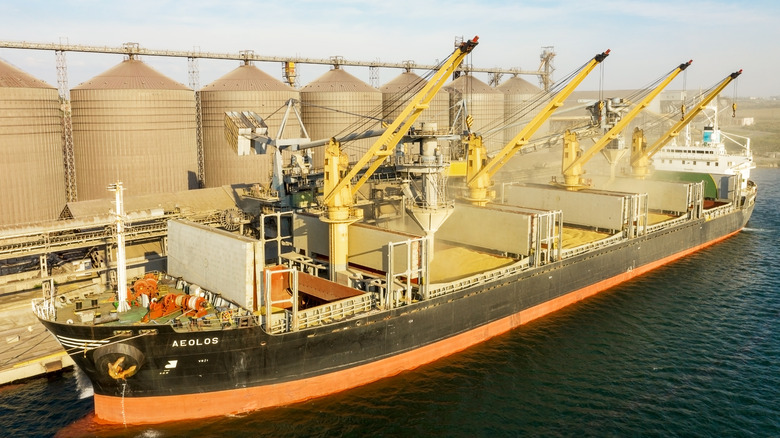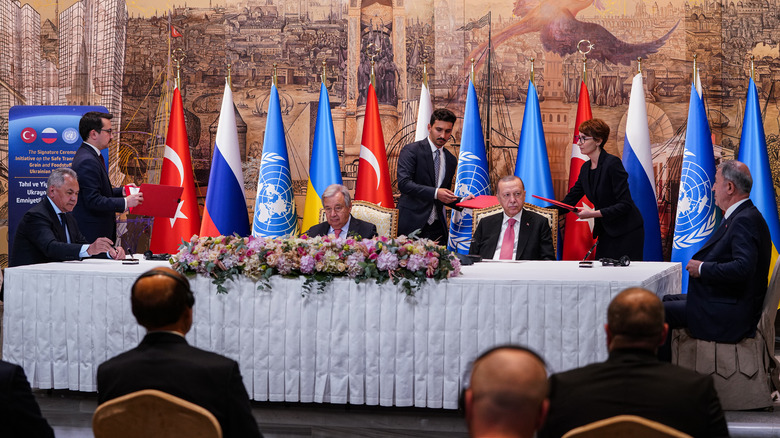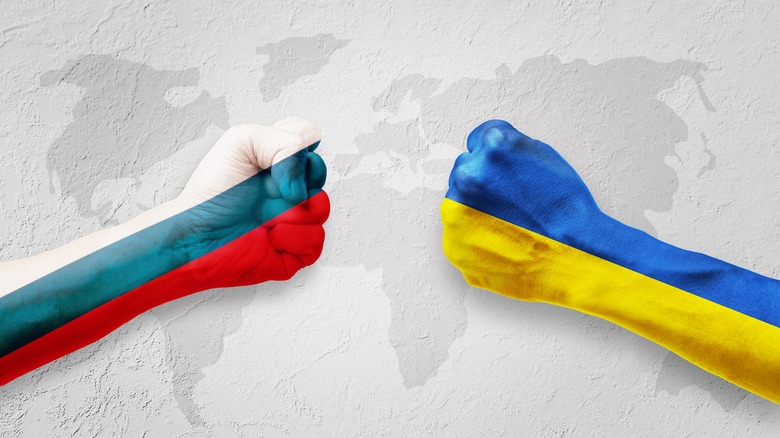The First Shipment Of Ukrainian Grain Has Finally Left The Country
A breakthrough was reached in Ukraine on August 1 as the Razoni, a Sierra Leone-based ship, became the first trading vessel to leave the port of Odessa on the Black Sea since Russia invaded its neighbor in February. According to Reuters, the ship, which is bound for Lebanon, is carrying over 26,000 tonnes of corn and must first stop in Istanbul to undergo an inspection by Turkish, Ukrainian, and Russian representatives before it can proceed to its unloading destination.
The departure comes less than two weeks after Russia and Ukraine signed a deal in Istanbul allowing for the export of grain and fertilizer, which have been sitting in storage since the start of the war (per Foreign Policy). The deal was brokered by Turkey and approved by the United Nations in hopes of alleviating a Global Food Crisis, though it immediately was called into question after Russian forces launched missiles at Odessa, Ukraine's largest port, shortly after the deal was signed.
Despite the setback, the plans to allow Ukrainian ships to bring grain and fertilizer to trading partners in the Middle East, Africa, and Asia have proceeded, with Ukrainian Foreign Minister Dmytro Kuleba calling Monday a "day of relief for the world" on Twitter (per Reuters).
In exchange for allowing Ukrainian exports, the EU will loosen some financial restrictions on Russia to make it easier for the country to export its own grains to its trading partners, according to the Carnegie Endowment for International Peace.
Fighting world hunger
Resumed trade on the Black Sea is expected to help ease the burdens of the growing world food crisis, which has driven up grocery prices around the world and pushed millions of people closer to famine. According to The Guardian, UN statistics show the number of people facing acute food insecurity has risen by 69 million since the start of the Ukraine conflict.
After the grain deal was announced, AP reports UN Secretary General Antonio Guterres called it "a beacon of hope." Since Ukraine and Russia together account for about 25% of the world's wheat crop (per New York Times), and Ukraine alone accounts for 40% of the world's sunflower oil and 16% of the global corn supply (via Wilson Center), the relief is understandable as approximately 22 million tons of grains will now be free to enter markets around the globe.
In addition to providing a hungry world with grains, the deal also helps Ukraine acquire much needed funds. As NPR notes, Ukraine made about 45% of its general income from agriculture, but many of the country's other industries have been destroyed or severely damaged by the war, leaving agricultural exports as the country's only large source of potential income — income it needs to continue fighting. Which raises other questions.
A tenuous agreement
Despite the warring nations agreeing to allow more trade, the conflict shows no signs of slowing down. Even as the Razoni set sail, AP was reporting on new tactics by Ukrainian forces to target Russian weapons with U.S.-supplied rocket launchers and try to take back occupied territory in the south of the country, while BBC noted the death of a Ukrainian agriculture tycoon in the port city of Mykolaiv. The home of Oleksiy Vadatursky was struck directly by a Russian missile overnight, killing the 74-year-old "Hero of Ukraine" award winner and his wife in what many Ukrainians believe was a targeted hit. Additionally, Foreign Policy notes the continued reports of Russian forces stealing Ukrainian farmers' grain and selling it through captured ports.
The continued conflict has led many Ukrainian farmers to view the deal with skepticism, with NPR reporting that some do not believe the deal will hold through the end of the year. However, according to RadioFreeEurope, that has not stopped many from acting while they can and continuing to harvest the new wheat crop even through dangerous conditions in order to keep people fed in Ukraine and around the world.


